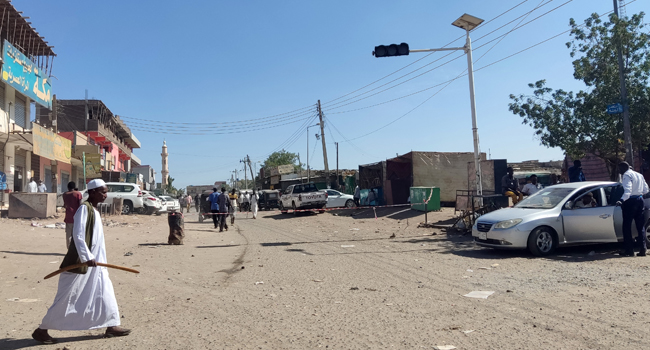Fighting between rival Sudanese forces, including air strikes on the capital Khartoum, have killed at least 33 civilians, pro-democracy lawyers said overnight to Friday.
Sudan has been gripped by nearly nine months of war pitting army chief Abdel Fattah al-Burhan against his former deputy, paramilitary commander Mohamed Hamdan Daglo.
The war has claimed at least 12,190 lives according to a conservative estimate by the Armed Conflict Location & Event Data project, and the United Nations says more than seven million people have been displaced.
On Thursday, 23 civilians were killed and several more wounded by aerial bombing in Khartoum’s Soba district, the Emergency Lawyers group said, blaming the army which maintains control of the skies.
The lawyers’ group confirmed 10 other deaths in artillery strikes, also in Khartoum.
A local group known as a resistance committee had reported the same deaths, saying “10 civilians were killed by artillery fire in residential areas and the local market”.
UNICEF’s representative in Sudan told AFP in an interview late Thursday that the war could create a “generational catastrophe” for the northeast African country’s 24 million children.
Mandeep O’Brien said those displaced include 3.5 million children, leaving Sudan facing “the largest displacement crisis in the world”.
“Sudan needs peace to avert a generational catastrophe,” she said.
“The future of the country is at stake: almost 20 million children in Sudan will not go to school this year without urgent action.”
Few areas of the country of 48 million people have been spared from violence, shortages and looting, with 14 million children needing emergency humanitarian aid, according to O’Brien.
The focus of the war, which erupted in mid-April in the capital, has shifted south and recently reached Sudan’s Al-Jazira state where hundreds of thousands of people had sought refuge.
The streets of the war-ravaged capital, where fighting continues, are controlled by Daglo’s Rapid Support Forces (RSF), while Burhan’s administration still puts out statements as the Sudanese government.
War Crimes Accusations
The RSF also holds nearly all of the western Darfur region, and in December pressed deeper into Al-Jazira state, shattering one of the country’s few remaining sanctuaries.
The resistance committees, which have provided assistance during the war, had organised pro-democracy protests before a 2021 coup by Burhan and Daglo derailed the country’s democratic transition.
The two generals then fell out, leading to war.
Daglo toured several African capitals from late December in his first foreign trip since the start of the conflict.
In Addis Ababa, he signed a declaration with Sudan’s former prime minister Abdalla Hamdok in what analysts say was a bid to position himself as a key interlocutor.
Both the army and the RSF have been accused of war crimes during the war.
International mediation efforts so far by the United States, Saudi Arabia and more recently the east African bloc IGAD have failed.
In its annual report published on Thursday, Human Rights Watch (HRW) said the Sudan conflict had “resulted in massive abuses against civilians”.
The failure to prosecute human rights violations in the country over the past two decades of conflict had created impunity that had “fuelled repeated cycles of violence in Sudan”, it added.
HRW said that Arab states and African governments had resisted efforts at the UN Human Rights Council to enforce accountability, while Western governments “were initially reluctant” to push for it or to commit the same level of resources they had done for Ukraine.
A majority of the council did eventually vote to create a mechanism for evidence gathering and preservation, but the Sudanese government has made clear it will not cooperate, said HRW.

